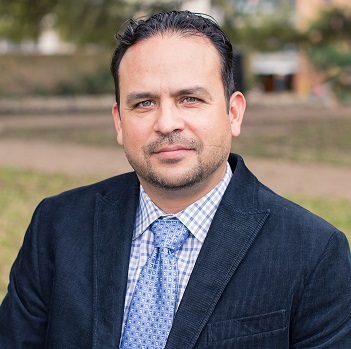Commentary on Jeremiah 33:[10-11] 14-18
The scene is total desolation. Or at least this is what Jeremiah saw through his limited human vision—just a devastated and colonized Judean kingdom. And yet this was not the only reality to be seen by the immobilized prophet. When we zoom out of our selected weekly passage, we see that it belongs to a two-part message of recovery and healing, with part one in 32:26-44 and part two as the entire chapter 33.
Seeing hope through the despair
Like the first message, a revelatory word of the Lord comes again to Jeremiah in his confinement in the court of the guard in the royal palace. Ultimately a hopeful message, the divine word, however, reveals an ethic of seeing that begins with the materiality of human despair. To begin here, at the ground level of imperial violence, the divine prophetic word does not negate Jerusalem’s destruction, but rather acknowledges its messy existence.
In 32:14, for instance, the prophet reiterates what he knows is plainly visible to God: “See, the siege-ramps have been cast up against the city to take it, and the city, faced with sword, famine, and pestilence, has been given into the hands of the Chaldeans who are fighting against it. What you spoke has happened, as you yourself can see.” Indeed, the prophet was not stating a new theological truth about a seeing God, for as early as Genesis, we encounter a God who sees the goodness of creation and, later as El-Roi, the God who sees the exploited and abused Hagar in the desert.
God and empire
And yet, at issue here is that the God of Israel did not only see the imperial violence but claimed to be its primary architect. In other words, God not only saw the empire colonize but was commanding the empire to engage in this violent activity. Such a theological claim raises the question of whether the Neo-Babylonian Empire saw its colonizing achievements in the same way. If asked directly, would its military leaders have acknowledged that the God of Israel was their commanding officer when they besieged the city of Jerusalem?
Clearly, the Chaldean warriors were operating under the theological premise that Marduk was their patron deity and that he had sanctioned Nebuchadnezzar’s military campaigns of imperial conquest. From the empire’s perspective, the retributive justice of the God of Israel had nothing to do with its imperial expansion.
Here, it is also reasonable to maintain that this empire did not colonize the Judeans to make them better God-fearing Hebrews but to dominate them under a new political and religious regime. To the Deuteronomists, however, accepting this imperial ideology would have meant negating their most fundamental theological claim, “See now that I, even I, am he; there is no god besides me. I kill and I make alive. I wound and I heal; and no one can deliver from my hand” (Deuteronomy 32:39). Hence, one way this totalizing claim accounted for the conquering violence of the Neo-Babylonian Empire—a colonizing system that professed the superiority of Marduk—was to subjugate it to the God of Israel.
For Jeremiah, his prophetic mission was not to convince the empire that their victory was made possible by his God. The role of his message was to maintain Deuteronomistic tradition by attributing the empire’s conquest to God’s punishment of Judah. While modern readers may find this theology difficult, there is something very subversive about rendering the “all-mighty” Neo-Babylonian Empire as something under the command of the God of Israel. Perhaps what is even more subversive is the message that the empire’s supremacy in the region was not permanent, which, as history shows, is a theological claim that can be applied to all earthly empires.
Hearing the empire’s end
Though it is probably more likely that imperial violence is exclusively a human product, bringing about its end is essential to God’s message: “Thus says the LORD: In this place of which you say, ‘It is a waste without human beings or animals,’ in the towns of Judah and the streets of Jerusalem that are desolate, without inhabitants, human or animal, there shall once more be heard the voice of mirth and the voice of gladness” (33:10-11).
Empires take pride in creating the natural disaster whereby all wildlife, plant life, and human life are annihilated, but God’s message offers the hope of an extraordinary reversal to empires. For where the Neo-Babylonian Empire sought to instill terror in those it colonized, God promised to restore the beautiful sounds of well-being and freedom. Rather than relying on sight, which, for Jeremiah, presented a gruesome scene “without human beings or animals,” God asked the immobilized prophet not to see but rather to hear the reversal of empire.
In other words, where the ghostly silence in the empty streets of Jerusalem was the resulting sound of imperial violence, God would return to these same streets the sounds of another failed empire. Rather than in the sounds of clashing swords, pounding siege-ramps, and groaning dead bodies (Jeremiah 33:4), hearing the empire fall would be in the jolly voices of playing children and in the celebratory music of a family festivity. Indeed, the songs of the once colonized Judeans would also testify to a short-lived empire, when lyrics that before were difficult to sing (Psalm 137:3-4) will come alive again, “for his steadfast love (hesed) endures forever” (see Psalm 136).
The human tendency to manufacture a new empire—one that colonizes people through brute violence—seems unavoidable. What if there was a person who could create another kind of empire? A sociopolitical system that aimed to execute justice for all people. Where everyone can be saved and live in safety. Where there is fairness and equal distribution of material goods. This is the empire God has Jeremiah imagine, an empire governed by a person called “The Lord is our righteousness” (33:16). To take hold of this world that God promises, Jeremiah must first hope through the despair, hear the voices of the empire’s end, and lastly, imagine its imminent arrival.
PRAYER OF THE DAY
God of the promised Messiah, as we wait for the fulfillment of your promise, we watch, we listen, and we open our hearts for your Word. Show us signs of your presence: a light in the darkness, a voice in the silence, and a stirring deep within us. Amen.
HYMNS
If you but trust in God to guide you ELW 769, H82 635, GG 816, NCH 410, UMH 142
O come, o come, Emmanuel ELW 257, H82 56, GG 88, NCH 116, UMH 211
Blessed be the God of Israel ELW 250
I’ve Got Peace Like a River GG 623, NCH 478, TFF 258
CHORAL
Stir up your power, O Lord, and come, Carl Schalk


December 3, 2023